With less than a year until the 2024 US presidential election and President Joe Biden all but certain to be the Democratic nominee, all eyes are on the field of Republican candidates vying for their party’s 2024 nomination. With former president Donald Trump leading the pack by an average of over 35 percentage points (no candidate in either party has failed to win the nomination from such a dominant position since the 1970s), speculation is mounting as to whether any of the other half-dozen major Republican candidates will be able to defy history and claim the nomination.
While Trump’s views on foreign policy and his fraught relationship with allies as president are largely known at this point, lesser known are the foreign policy views of his Republican primary opponents and the impact they may have on Australia, its allies, and the issues that shape our world today. While their campaigns may in some instances be considered long-shots, it is important to understand their views given the influence they may wield as presidents, or as figures in a potential second Trump administration.
This explainer covers the foreign policy views, and what Australia needs to know about them, of the top eight contenders other than Trump who qualified for the first Republican debate on 23 August 2023.
This article was first published on 23 August 2023.
Nikki Haley
Known for: US Ambassador to the United Nations (2017–18); Governor of South Carolina (2011–17)
Home state: South Carolina
Age in 2024: 52 (born 20 January 1972)
Who are they?
The daughter of Indian immigrants, Nikki Haley has had a rapid rise to prominence. The one-time South Carolina state representative (2005–11) became the state’s youngest ever, and first female, governor in 2010 at just 38 years old. During her time as governor, she gained national attention for her controversial decision to remove the Confederate flag from State House grounds in 2015. Haley was then appointed US Ambassador the United Nations during the Trump administration in 2017, becoming the first ever Indian American in the role. During her tenure, in which she was a leading voice on foreign policy in the administration, Haley oversaw the withdrawal of the United States from the UN Human Rights Council and had a public spat with the White House over whether or not further sanctions would be imposed on Russia. In the immediate aftermath of 6 January 2021, Haley did not publicly challenge or criticise Trump, instead saying that he “genuinely, to his core, believes he was wronged.” Since announcing her presidential intentions, however, Haley has been more openly critical.
“Just saying, sometimes it takes a woman.” — 17 July 2022
What should Australians know?
Haley’s campaign has been noted for its foreign policy emphasis. Haley has spoken of the need to align with non-European countries, including Australia (and, infamously, Russia) to secure access to energy and strategic resources, and called for the United States to strengthen its military ties with Indo-Pacific allies given the region’s strategic importance. In February 2023, Haley vowed to “cut every cent in foreign aid for countries that hate [the United States]", listing Iraq, Zimbabwe and Cuba as examples of “bad guys” and “enemies” whose foreign aid budgets should be cut in favour of “American allies and friends like Israel and Ukraine.” As a former Ambassador to the United Nations, much of Haley’s international record centres on human rights issues and international norms. Haley has pushed for a “term limit” for federal bureaucrats of five years after which they would be “rotated” or fired if they “are not performing”. She also has pushed for Congress to be forced to vote on every regulatory change to encourage the cutting of red tape. At 51 years of age, Haley has emphasised her relative youth as a chance to hand over political power to a “new generation” and called for cognitive testing for politicians over the age of 75, which would include both Trump and Biden.
“America needs a new generation of leaders to renew our national strength and pride.” — 1 May 2023
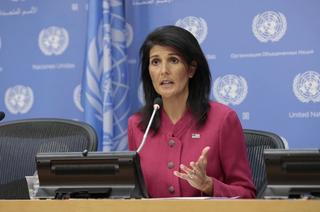
Foreign policy
China
Haley wants the United States to “think about China critically, creatively and courageously” and promised to be “China’s worst nightmare.” She has laid out a range of proposals to do so, including pushing to ban federal funding for universities that accept Chinese funding, preventing Chinese investors from purchasing land, and enticing US businesses to “leave China as completely as possible.” Haley wants to “#BanTikTok,” in the belief that this would "stop giving the Chinese Communist Party the ability to influence Americans." She has also argued that US agricultural dominance is necessary “so that China is always dependent on America for their food.” Haley has attacked both Biden and Trump for what she sees as weak responses to China and described the country as an "existential threat."
“Xi Jinping is not our friend, so let’s stop acting like it.” — 20 November 2023
Ukraine
Haley supports US involvement in Ukraine to bolster its resistance against Russia, arguing it is in the US national interest. During discussion over Ukraine in the third Republican debate, Haley commented that the United States should provide Ukraine with“the equipment, the ammunition to win.” She has also asserted that China is watching the war “with great interest,” warning that “a win for Russia is a win for China” and weak US support for Ukraine would “only encourage” China to invade Taiwan. During the first Republican debate, Haley described Ukraine as the “first line of defence” for the United States, and accused rival Vivek Ramaswamy of “hand[ing] Ukraine to Russia” and therefore “let[ting] China eat Taiwan” due to his opposition to continuing US aid to Ukraine. During her time as US Ambassador to the United Nations, Haley strongly criticised Russia for its 2014 annexation of Crimea and supported US sanctions, though in 2018 she was drawn into a public dispute with her own administration in 2018 when she announced sanctions on Russia over its actions in Syria.
“If Ukraine wins, China walks away [from] Taiwan” — 8 September 2023
Taiwan
Haley has stated that Beijing’s military build-up and escalating aggression toward Taiwan indicates that China is “preparing its people for war” and “it’s not a matter of if but rather when there’s going to be an invasion.” She has called for the United States and its allies to stand with Taiwan “without apology” and provide “everything” it needs to bolster its military and economic strength to deter a Chinese invasion, including maintaining a strong US naval presence in the Taiwan Strait. Similarly to rival candidates Chris Christie and Doug Burgum, Haley has warned that any weakening of Western resolve in Ukraine would embolden China to invade Taiwan, saying that “failure in Europe will encourage war in Asia.”
“We should stand with Taiwan without apology — because our security is intertwined.” — 28 June 2023
“This is a war about freedom and it’s one we have to win.” — Nikki Haley, 4 June 2023
Trade
Haley has described herself as a “firm believer in economic freedom,” but also noted that “not all trade with all trading partners is the same,” suggesting that US companies should prepare for an economic decoupling from China and that “if it is not made in America, we want a friend to make it.” While she has made few public comments on the TPP, she has called for a US-Taiwan free trade deal and was also a signatory of a 2015 letter to Congress supporting legislation to reauthorise the US Export-Import bank to allow “our companies and workers to compete on a level playing field against international competitors.” Haley has stated that as president she would "end all normal trade relations with China" until the flow of fentanyl to the United States is stopped. She has denounced Trump's planned tariffs on US imports as "ludicrous" but suggested that she would support higher tariffs on China.
“While Beijing has abused the free market in order to destroy it, America must harness the free market to protect our freedom and national security.” — 20 May 2020
Climate change
While Haley has acknowledged that climate change is “real,” she is against policies that “demonize” the private sector or weaken the US economy, and has condemned President Biden’s energy policies as “anti-American.” As US Ambassador to the United Nations, she stood by former President Trump’s withdrawal from the Paris Climate Agreement in June 2017, a controversial decision that disappointed US allies like Australia. At the time Haley claimed that this “doesn’t mean we don’t believe in climate protection,” placing the blame on former President Barack Obama for agreeing to regulations that were “too onerous” and disadvantaged US companies. In 2014, during her governorship of South Carolina, she spoke out against the Obama administration’s Clean Power plan, arguing the proposed power plant carbon-cutting mandates would cost the state jobs and force it to take “two steps back” economically. A 2020 video released by her advocacy group Stand for America heralded “free market solutions” like carbon-capture technology, reforestation, energy storage solutions and fracking. In June 2023, she called for the United States to bolster its domestic energy security and end reliance on countries like Russia by producing domestic oil and ending the Biden administration’s permits and regulations on energy producers. During the first Republican debate, Haley minimised the need for US environmental action, arguing that climate change is “real” but that the onus lies on China and India to lower their emissions.
“We’re not saying that climate change is not real. It is real. It’s how do you have that balance between making sure you’ve got jobs and businesses moving and then also making sure you protect your climate.” — 8 August 2017
Israel
Haley has been described in Israeli media as a “star among pro-Israel Republicans.” As US Ambassador to the United Nations, Haley accused the UN of “bullying” Israel for its treatment of Palestinians and earlier supported the moving of the US embassy from Tel Aviv to Jerusalem. She praised Israel’s “restraint” after the killing of 60 Palestinian protestors at the Gaza border in 2018.
Haley has been a vocal supporter of Israel, saying that “a Haley administration will always have Israel’s back.” She has characterised the ongoing war with Hamas as a “battle between good and evil” and a conflict that “will determine our civilisation’s survival." Haley has said that victory for Israel in its war with Hamas would “warn Russia and China not to mess with our friends and allies,” and that no ceasefire or pause should be reached, describing the UN resolution for an immediate ceasefire as “shameful.”
She has also criticised Biden’s response to the crisis, arguing that the president “needs to wake up” after, Haley says, he “green lit $10b to Iran.” Haley says that Iran "only responds to strength" and at the United States should target Iran's "infrastructure in Syria and Iraq."
“It is not that Israel needs America. America needs Israel.” — 8 November 2023
Asian alliances
Haley has described the Indo-Pacific region as a “consequential force” in the 21st century and has called for the United States to strengthen its alliances beyond Europe “so that the world is more safe.” She has emphasised the vital role of democracies in shaping the future of the Indo-Pacific, and the importance of ensuring “Taiwan, Japan, South Korea, Australia and all our friends and allies in the Pacific are safe from Communist China.” In efforts to counter threats from China, Haley has argued the United States should enhance its foothold in Asia and “rally nations” to its side by forging stronger military ties with Australia, Japan and South Korea, and stronger bonds with India and the Philippines. She has also strongly supported the AUKUS partnership with Australia. She has been especially vocal on US-India relations, previously calling for the United States to formalise an alliance with India and describing it as a “vital strategic partner” in securing peace and prosperity in the Indo-Pacific.
“We absolutely need to strengthen that [AUKUS] partnership.” — 5 February 2024
Read more
- The New Yorker: Why is Nikki Haley Running for President?
- Wall Street Journal: My plan to confront the China threat
- Council on Foreign Relations: Meet Nikki Haley, Republican Presidential Candidate
- The Conversation: Nikki Haley : the ‘new generation’ candidate trying to win the Republican nomination
Ron DeSantis
Known for: Governor of Florida (2019–present)
Home state: Florida
Age in 2024: 46 (born 14 September 1978)
Who are they?
After winning re-election for his Florida governorship in the November 2022 midterms by the largest margin in forty years, Ron DeSantis quickly emerged as the top non-Trump contender for the Republican presidential nomination, and led Trump in some head-to-head polls as recently as March 2023. The former Congressman (2013–18) and US Navy veteran was elected Governor of Florida in 2018, and was once a political ally of Donald Trump. Known for leading Florida’s pandemic response, ‘war on woke’ policies, feud with Disney and ‘anti-woke’ educational reforms on LGBTQI+ issues and slavery, DeSantis was famously labelled ‘DeFuture’ by the New York Post after his 2022 re-election win. However, after a glitchy start to his campaign, DeSantis has continued to struggle to recapture the enthusiasm that Republican voters once had for him.
“I’m running for president because we need to reverse the decline in this country.” — 31 July 2023
What should Australians know?
DeSantis has been noted for his mercurial foreign policy positions, though he previously self-described as a member of “the Reagan school that’s tough on Russia.” In 2021, he strongly criticised the strictness of Australian coronavirus measures, comparing Australia to “communist China” and questioning whether the United States should maintain its relationship with Australia as “not a free country at all.”
An emerging split within the Republican party over foreign policy — most acutely visible on the issue of US support for Ukraine — has made the political landscape difficult to navigate for DeSantis, who has wavered between traditional interventionist policies and following Trump’s isolationist rhetoric. While his conservative domestic politics are well known, where he finally lands on this foreign policy divide would shape the way he engages with Australia and the region.
“What the Soviet Union was to us [after the Second World War], that’s really what China represents with the CCP in terms of the threat to the free world. Our national security strategy has really got to view the Indo-Pacific like we did Europe after World War II.”— 25 April 2023
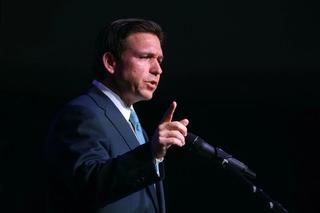
Foreign policy
China
Like his rival candidates, DeSantis has taken a ‘tough on China’ stance prioritising wresting economic control from China, which he has labelled the “the number one geopolitical threat” faced by the United States. During the second Republican debate he argued that “we need to reshore and we need to decouple” the US economy from China and that “we are going to have real hard power in the Indo-Pacific, like Reagan, to deter [China’s] ambition.” He has attacked other candidates for their records on China, particularly Nikki Haley, saying they have failed to ‘stand up’ against it. His economic policy plan calls for ending normal trade relations with China and the banning of Chinese imports made from stolen intellectual property. He would also seek to prevent US companies from sharing advanced technologies with China and consider a ban on TikTok in the United States. DeSantis has also criticised Biden's approach to China, stating that under a DeSantis presidency "the era of appeasement is over."
“We are no longer going to sell out to China at the expense of the American working family.” — 31 July 2023
Taiwan
DeSantis has said China “clearly wants to take Taiwan at some point,” and that he would “marshal hard power in the Indo-Pacific” to deter an invasion. He has previously described Taiwan as a “critical interest” for the United States and a “strong ally” but, in line with the US policy of ‘strategic ambiguity’, demurred on whether he would respond to an invasion with military force.
“Ultimately, what China respects is strength.” — 25 April 2023
Trade
In Congress, DeSantis voted to grant President Obama the ‘fast-track’ authority (Trade Promotion Authority) required to finalise Trans-Pacific Partnership negotiations in 2015 and later voiced his broad support for free trade and “lower barriers” amidst Trump’s calls to impose tariffs on Chinese imports in 2018. Yet, aside from launching an International Trade Mission in April 2023 to enhance Florida’s economic partnerships abroad, his recent economic positions seem to mirror the more isolationist policies of former president Trump, including reducing trade with China and promoting US energy independence. DeSantis’ primary target is China, as well as DC ‘elites’ who, he considers, favour a “global economy” at the expense of US “national sovereignty.” Echoing rival candidate Vivek Ramaswamy’s bid to declare US “economic independence" from China — and extending it to a call to declare independence from “failed elites” — DeSantis’ economic blueprint aims to restore US “economic sovereignty” by reversing the nation’s trade deficits with China and taking executive action to revoke China’s permanent normal trade relations status.
“We will declare our economic independence from the failed elites that have orchestrated American decline. We the American people win; they lose.” — 31 July 2023
Ukraine
DeSantis attracted heavy criticism in March 2023, including from fellow Republicans, for describing the war in Ukraine as a “territorial dispute” in comments which he has since walked back. He has previously pivoted away from articulating a clear position on the conflict and whether US military support for Ukraine should continue, but said during the first Republican debate that Ukraine needs to “pull their weight” and that he “would not support an increase of funding to Ukraine.” During the third Republican debate, DeSantis said that “we need to bring this war to an end” and pointed to US border security as a more important issue. DeSantis has argued that NATO states should step up their support for Ukraine to allow the United States to instead focus on working with its Indo-Pacific allies on countering China. He has also labelled Russian President Vladimir Putin a “war criminal” and in April 2023 called for a ceasefire to be reached. DeSantis opposes Ukraine’s membership of NATO because he believes it is not in US security interests and would “add more obligations” for few benefits in return.
“We cannot prioritize intervention in an escalating foreign war over the defense of our own homeland.” — 13 March 2023
Climate change
As governor of a state that has been singled out by the United Nations as especially vulnerable to climate disaster, DeSantis has had to comment on climate-related issues more than any other GOP candidate. Promises to address Florida’s polluted waterways and beaches were central to DeSantis’ messaging — and success — when he first ran for governor in 2018. Yet experts have characterised his environmental record as “confusing.”
DeSantis notably steers clear from the phrases ‘global warming’ and ‘climate change,’ which he believes advocates use to “smuggle in their ideology.” As governor, DeSantis created a state-level Chief Resilience Officer position tasked with leading adaption efforts and passed legislation to restore wildlife and funnel hundreds of millions into protecting coastal communities at risk of sea-level rise, praised as a good move by some conservation groups. At the same time, he has drawn criticism from environmentalists for adopting bills preventing Florida’s cities from setting 100 per cent renewable energy targets and fund managers from considering the environmental impacts of investment decisions.
While DeSantis touted his efforts to lead Florida’s recovery following 2022’s Hurricane Ian, he also fervently rejected any links between the extreme weather event and climate change. DeSantis echoed these sentiments in the aftermath of Hurricane Idalia which hit Florida in late August 2023, denouncing “very-left wing” federal climate policies that he believes do little to prevent extreme weather events. If elected, DeSantis has pledged to withdraw the United States from the Paris Climate Agreement, bolster domestic oil and natural gas production, repeal Biden administration subsidies for electric vehicles and eliminate environmental, social or governance considerations from government investments, echoing anti-ESG legislation he signed into law as Governor of Florida.
“I’ve always rejected the politicization of the weather.” — 25 May 2023
“I’ve always rejected the politicization of the weather.” — Ron DeSantis, 25 May 2023
Israel
DeSantis once vowed to be “the most pro-Israel governor in America.” He has hailed Israel as “one of the most valued and trusted” US allies, previously taking numerous trips to Israel, voicing opposition to Florida companies boycotting Israel and pressuring then-president Trump to relocate the US embassy from Tel Aviv to Jerusalem.
DeSantis has demonstrated strong support for Israel in the ongoing Israel-Hamas conflict, stating that as president he would “be telling Bibi: Finish the job once and for all.” He has denounced “people [who] blame Israel just for defending itself,” and described the United Nations resolution for an immediate ceasefire as an “absolute disgrace.” Under his leadership, DeSantis said he would “defund the UN,” which he describes as a “corrupt, morally bankrupt, hotbed of antisemitism.”
DeSantis has also attacked President Biden’s response to the crisis, saying that Biden is “not doing what it takes to stand by Israel” and arguing that the recent US$100 million humanitarian aid package for Palestinian people in Gaza and the West Bank will be “commandeered” by Hamas. DeSantis has also called for Biden to “shut off the oil money to Iran” and recently strengthened state sanctions on businesses aligned with Iran due to the belief that “Florida must not be complicit in funding state-sponsored terrorism against America’s great ally, Israel.” He has also stated that he opposes a two-state solution, in the belief that a separate Palestinian state would “end up becoming a hotbed of terrorism.”
“We will stand with Israel in word and in deed, in public and in private.” — 8 November 2023
Asian alliances
DeSantis has said he would “prioritise the Indo-Pacific region as the most pressing part of the world for defending US interests and US security” and emphasised the need for the United States “to do more in the Indo-Pacific from a military perspective.” He has called for NATO to increase their support for Ukraine to allow the United States to “take the lead working with our Indo-Pacific allies on China.” He previously described the Quad as a “good framework,” and, in an interview in June 2023, DeSantis argued that the grouping between Australia, the United States, Japan and India, should be expanded to form a US-led multilateral military alliance in the Pacific. While he is yet to flesh out the full details of the proposal, DeSantis has stressed that the military alliance would be “based on US interests” and operate differently to the North Atlantic Treaty Organization (NATO), where he believes the United States “write[s] the check on everything” and is entangled with European allies who “don’t see eye to eye with us on China.”
Throughout his international trade tour in April 2023, DeSantis demonstrated strong support for US alliances in the Indo-Pacific. DeSantis highlighted the importance of US ties with Japan, lauding the US-Japan alliance as a “cornerstone” of US strategy and vital to responding effectively to rising threats from China and North Korea. In his meeting with Japanese Prime Minister Fumio Kishida, DeSantis commended Japan’s recent efforts to double its military spending and flagged the need for greater regional military investment from the United States. At a later stop on the diplomatic blitz, DeSantis met with South Korean Prime Minister Han Duck-Soo to affirm the US-South Korea alliance on the 70th anniversary of bilateral ties, urging greater US cooperation with South Korea and reportedly exchanging views with the leader on unspecified “regional and global situations, including in Northeast Asia.”
“We have to be able to project hard power in the Indo-Pacific. They [China] are not going to want to do something like invade Taiwan if they see the United States, Japan, Korea, if they see that power there, they’re going to take the path of least resistance.” — 27 July 2023
Read more
- Politico: What the world looks like to Ron DeSantis
- New York Times: Is Ron DeSantis the Future of the Republican Party?
- Time Magazine: Ron DeSantis Can’t Out-Trump Trump
- The Washington Post: ‘A long slog’: Inside DeSantis’s early struggles and effort to rebound
Vivek Ramaswamy
Known for: Co-founder and executive chairman of Strive Asset Management (2022–present), Founder and CEO of biotechnology company Roivant Sciences (2014–2021)
Home state: Ohio
Age in 2024: 39 (born 9 August 1985)
Who are they?
Ramaswamy is the youngest GOP candidate and currently the only millennial to poll at one per cent or higher in national polls. Unlike the crowd of established political operatives, including current and former state governors, members of congress and an ex-vice president, Ramaswamy entered the race as a first-time candidate with no prior political experience. He brings a different important asset for presidential campaigning: a net worth reportedly exceeding US$630 million. The multimillionaire first made his name leading a pharmaceutical company with a streak of successful clinical trials that brought five FDA-approved products to the market. A self-described ‘anti-woke’ activist, Ramaswamy has written multiple New York Times bestsellers denouncing identity politics and socially-conscious investing, and recently founded a Peter Thiel-backed asset management fund that encourages corporations to place financial profits above environmental, social and governance (ESG) efforts.
“One way or another, [the Republican nominee is] going to be an outsider.” — 14 April 2023
What should Australians know?
Of all the Republican candidates, Ramaswamy has spoken the most candidly and extensively about Australia, outlining specific policy prescriptions for it to play a stronger role in competing with China. This includes Ramaswamy’s call for Australia to bolster its support for Taiwan and his pledge, if elected, to overcome obstacles to delivering US submarines to Australia, a centrepiece of the AUKUS pact. Leaning into his ‘outsider’ branding, it is perhaps best to understand Ramaswamy’s campaign as a succession of Donald Trump’s, with the 2024 hopeful often positioning himself in lockstep with the former president and echoing many of his anti-establishment gripes. Much like Trump’s leadership of the Republican party, a Ramaswamy administration is unlikely to be predictable or conventional in its policy approach, with the bio-tech entrepreneur already signalling that he would rely heavily on executive actions to carry out his agenda as president and seek to enact laws “without the permission or forgiveness of Congress.” He has taken a particularly hard line on the federal bureaucracy, saying he would “fire 50% of federal bureaucrats” on his first day in office and require political appointees to sign a “No to Neocons” isolationist pledge.
“I am taking the Trump America First agenda to the next level to actually get the job done.” — 1 March 2023
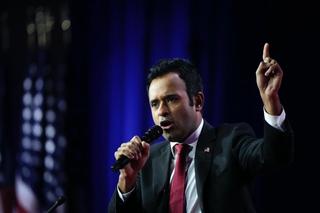
Foreign policy
China
During the first Republican debate, Ramaswamy said the “Russia-China military alliance is the single greatest threat we face.” Arguing that the language of ‘de-risking’ (diversifying supply chains away from China rather than ‘decoupling’ and severing economic ties) is "effete,” he has called for the United States to “declare economic independence” from China and take immediate steps towards decoupling, like banning US businesses from expanding into China and preventing “CCP affiliates” from buying US land. Ramaswamy has also said that the United States should reduce its supply chain dependencies on China for components of its advanced weaponry, arguing that the United States is currently “suicidally dependent” on its “chief adversary” to meet its defense needs.
Ramaswamy thinks the AUKUS pact neatly aligns with his “tough love” vision for US engagement with China. Stressing the need for US submarine production to increase unabated, he has vowed and establish a new floor of 4% of GDP on US military expenditures to ensure that Virginia-class submarines are delivered to Australia on schedule. Ramaswamy has also advocated for strengthening US-India relations to counter China’s influence in the Indo-Pacific. He supports an “AUKUS-style deal” with India to “share nuclear submarine technology and empower the Indian navy.”
“I’m not sure that I see the path between [China and the US] as one in the near term that involves healing. I think it involves tough love, and Australia, I think absolutely could play a role in this.” — 23 July 2023
Taiwan
Ramaswamy believes that "strategic ambiguity” about whether the United States will defend Taiwan against invasion creates “mutual confusion” with China that increases risks of a US-China conflict. He has stated that in his first term as president he would move from a position of US “strategic ambiguity” on Taiwan to “strategic clarity” to be “crystal clear” that the United States “will defend Taiwan” militarily.
Ramaswamy believes China’s “annexation of Taiwan would spell disaster for US interests,” and has previously urged US companies to better prepare for potential risks to the global economy driven by Taiwan’s dominance in the semiconductor industry. He has emphasised deterrence, repeatedly suggesting the National Rifle Association should open a branch on the island and arm every Taiwanese household with a gun, in an effort to “export” the US Second Amendment and “make Xi Jinping think twice” about invading Taiwan. He also believes that Taiwan should double its own military expenditure to a “more rational” 4–5 per cent of GDP.
Ramaswamy has explicitly called for Australia to take a “stronger posture” in defence of Taiwan, and consider boosting Australian military assistance, diplomatic visits and trade initiatives with Taiwan in a “porcupine strategy” of multiple defensive measures to deter China. He also thinks that if the United States and India strengthen their military partnership, India could help the United States block maritime routes crucial for China's oil supplies in the event of a war in Taiwan. He believes a potential blockade would further deter China from invading Taiwan.
However, Ramaswamy has made it clear that this explicit and affirmative commitment to Taiwan’s defence will expire once the United States has gained “semiconductor independence,” something he has pledged to achieve as president by 2028. While not detailing precisely what this means or how it could be achieved, in August 2023 Ramaswamy argued that US dependency on Taiwan’s advanced semiconductor industry creates “great vulnerabilities” for the United States. In his view, Beijing has two key reasons to invade Taiwan: to “exert leverage” over the United States by disrupting global semiconductor supply chains, and to address “unfinished nationalistic business” from the 1949 civil war. After the United States has gained “semiconductor independence,” an objective of his hypothetical first-term, Ramaswamy believes that involvement in a conflict would no longer be in the US self-interest, in what he sees as a parallel to his position on US commitments to Ukraine. He later clarified that, at this point, the United States would "resume the status quo” and return to a posture of strategic ambiguity.
“Xi Jinping should not mess with Taiwan until we have achieved semiconductor independence, until the end of my first term, when I will lead us there. And after that, our commitments to Taiwan and our commitments to be willing to go to military conflict will change after that because that's rationally in our self-interest. That is honest. That is true. And that is credible." — 14 August 2023
Trade
Ramaswamy sees trade as a tool to counter China and is eager to strengthen trade relationships and deliver increased US market access for trading partners willing to push back against Chinese economic coercion. Ramaswamy’s plan for "sensible” decoupling from China involves onshoring critical supply chains, like pharmaceuticals, to the US, and expanding trade relations with allies like Japan South Korea, Israel, India, Chile and Brazil. He supports the push to designate Australia as a “domestic source” within the meaning of Title III of the US Defence Production Act. That proposal, unveiled by President Biden and Prime Minister Albanese in May 2023, would allow Australian-based production and manufacturing companies to access billions in US government investments, and has been billed as a development that would streamline Australia-US industrial base collaboration and accelerate the implementation of the AUKUS pact. Ramaswamy has also signalled that he would consider re-joining some form of a bolstered Comprehensive and Progressive Agreement for Trans-Pacific Partnership (CPTPP) — something the Australian Government has long hoped for since the US withdrawal from TPP in 2017. However, he has primarily focused on the need to enact bilateral trade deals with "trusted allies and hemispheric neighbours,” arguing that the United States should diversify its supply chains away from China to Chile for lithium and to countries like Brazil and India for rare earth minerals.
“Opening up trade relationships, including between the US and much of the Pacific Rim, including Australia, will strengthen and put the US in a stronger position to be able to get China to the table on economic reforms.” — 23 July 2023
“Opening up trade relationships, including between the US and much of the Pacific Rim, including Australia, will strengthen and put the US in a stronger position to be able to get China to the table on economic reforms.” — Vivek Ramaswamy, 23 July 2023
Ukraine
Ramaswamy believes that US support for Ukraine “does not advance American interests”and that “just because Putin is an evil dictator does not mean that Ukraine is good.” Arguing that NATO’s expansion in part provoked Russia’s decision to invade, Ramaswamy has voiced strong opposition to Ukraine’s accession to the military alliance, going so far as to characterise Ukrainian NATO membership as “sheer lunacy” that would “march us to the brink of nuclear war.” Ramaswamy's chief concern is that US “blind support” for Ukraine threatens to push Russia into a closer military alliance with China and thus distracts from the “vital US security objective” of weakening Beijing.
He has pledged as president to cease further US support for Ukraine and negotiate a peace treaty with Russia. This would involve making “major concessions,” including a permanent moratorium on Ukraine joining NATO and lifting sanctions against Russia, in the hope that Russia would reduce its engagement with China, re-enter the New START nuclear non-proliferation treaty and withdraw its various nuclear weapons and delivery capabilities in return. Ramaswamy said he would visit Moscow in 2025 to broker the deal, citing former US President Richard Nixon’s 1972 visit to China as his inspiration.
“As President I’ll refuse to be bullied by an anti-democratic comedian-turned-leader & it’s truly mystifying to me that the rest of the West is eating out of this Pied Piper’s hand every day.” — 9 July 2023
Climate change
Ramaswamy views climate activism as a lightning rod for “wokeism” and one of three “secular religions,” along with sex and race, that have corrupted US national identity. A figurehead of the movement against corporate adoption of environmental, social, and governance (ESG) policies, Ramaswamy has also railed against “climatism,” which he defines as “prioritising the goal of containing climate change at all costs,” and believes ultimately distracts Washington from more pressing foreign policy priorities like competing with China. While he does not identify with the label of “climate denier,” in Ramaswamy’s view global warming is “not entirely bad,” the goal of limiting emissions is “flawed,” and people should be “proud” to live a high-carbon lifestyle.
During the first Republican debate, he said that “more people are dying of bad climate change policies than they are of actual climate change.” Ramaswamy is a proponent of nuclear power and has suggested environmentalists intentionally overlook the energy alternative because “it’s too good” and would “solve” the climate crisis. He wants to “unlock American energy” and increase US supply of oil and gas by “drilling, fracking, burning coal, embracing nuclear,” which he describes as “sensible policies” for both reducing inflation and delivering economic growth. He has emphasised the need to “declare independence from the climate agenda”, which Ramaswamy claims is “letting China catch up to the US economically.” Ramaswamy has said as president he would roll back Biden administration subsidies for electric vehicles and solar panels, in the belief that they are “subsidising the Chinese Communist Party” due to US dependencies on China for rare earth minerals and mineral refining processes. Ramaswamy has since promised that on his first day in office he would rescind "any unconstitutional federal regulation" that requires “even the measurement or the reporting of carbon dioxide emissions."
“What is really going on is that the climate religion has about as much to do with the climate as the Spanish Inquisition had to do with Christ, which is to say nothing at all. It is about power, dominion, control, punishment and apologising for what we have achieved in this country and the modern West as we know it.” — 4 March 2023
Israel
In contrast to his rival candidates, Ramaswamy has demonstrated a more conditional approach to US involvement in the war in Israel, saying that descriptions of Hamas’ attack as an “attack on America” or calls to “finish them” are irresponsible and concerning. During the third Republican debate Ramaswamy stated that “Israel has the right and the responsibility to defend itself” and has outlined his support for “robust intelligence support” for Israel and “additional military supplies via both sale and transfer.”
However, Ramaswamy has argued that US assistance to Israel must be “contingent" on Israel’s plans in Gaza. He believes that Israel’s current approach lacks “clear objectives,” stating that “‘destroy Hamas’ is not on its own a viable or coherent strategy.” Ramaswamy has also criticised President Biden’s tying together of the Israel-Gaza and Ukraine conflicts, claiming that Biden is attempting to “avoid debate on the merits on either one.” Ramaswamy has strongly denied that his approach is “anti-Israel," arguing that his “sole obligation” is to the “citizens of our nation,” and his position is simply “pro-America.”
“A ground invasion into Gaza with no clear long-term objective is a recipe for a no-win war that will be bad for Israel and bad for the US.” — 22 October 2023
Asian alliances
Beyond calling for bolstered US trade engagement in the Indo-Pacific region, Ramaswamy has also floated the idea of establishing a Pacific American Treaty Organisation (PATO) with US allies and partners. Though short on specifics, he said the alliance would seek to include Australia, South Korea, Japan, India, "much of Southeast Asia” and potentially even Russia, in his broader bid to deter Chinese aggression. Ramaswamy has also called for an increase in US naval capacity by 20 per cent to “be able to meet our AUKUS agreement standards.” He has stated that Australia, Japan and the Philippines should expand their defence budgets. He has also called for US allies in Asia, Oceania and Europe to deepen their investment in poorer regional countries such as the Polynesian Islands to “offset Chinese economic influence.”
“I see a more pressing need for PATO, the Pacific American Treaty Organization, than I see for NATO, to actually rise to the occasion of the threat that we see in the 21st century.” — 5 June 2023
Read more
- The New Yorker: The C.E.O. of Anti-Woke Inc.
- Council on Foreign Relations: Meet Vivek Ramaswamy, Republican Presidential Candidate
- Australian Financial Review: Australia should step up Taiwan defence, says US presidential hopeful
- Washington Post: He wrote the book on crushing ‘wokeism.’ Now he’s running for president
Mike Pence
Known for: Vice President of the United States (2017–21); Governor of Indiana (2013–17)
Home state: Indiana
Age in 2024: 65 (born 7 June 1959)
Who are they?
Famously self-described as “a Christian, a conservative, and a Republican, in that order”, the former Governor of Indiana (2013–17) and Congressman (2001–13) is best known for his association with his former boss and president, Donald Trump, as his Vice President between 2017 and 2021. Noted for his quiet contrast to Trump’s bombast, Pence loyally stood by Trump throughout almost his entire presidency. However, the events of 6 January 2021, in which Pence refused to interfere with the certification of the 2020 election result, created a rift between the pair that set the stage for Pence to run for the presidency against his former boss. The dynamic between Trump and Pence, who must now try to distinguish himself from the former president without alienating his supporters, will be one of the most intriguing to watch in the GOP race.
“A Christian, a conservative, and a Republican, in that order.” — Long-time slogan
What should Australia know?
As Vice President, Pence emphasised the “strong and historic alliance” between the United States and Australia, and played a role in soothing allies unsettled by Trump’s approach to diplomacy as president. He would bring a more traditionally conservative approach to the presidency, with a hawkish approach to China and its human rights and the war in Ukraine, and a commitment to established alliances.
“Australia is, and always will be, one of America’s closest allies and truest friends.” — 22 April 2017
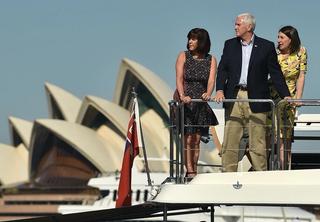
Foreign policy
China
Pence is noted for his hawkishness on China — as Vice President, he delivered a 2018 speech to the Hudson Institute once described as the “toughest speech on China by any American leader in recent history.” In 2019, he denied that the Trump administration was seeking to “decouple” from China or to “contain China’s development”, and was instead pursuing engagement “in a manner consistent with fairness, mutual respect, and the international rules of commerce.” However, since leaving office, Pence has accused the Biden administration of “already rolling over to communist China” and called for Biden to “decouple the American economy from China in industries that are essential to the American people”, like semiconductors and rare earth minerals, and to strengthen economic relations with Taiwan. He wants to raise US defense spending to a minimum of 3.5% of GDP to counter China and supports growing the US Navy fleet to “eclipse the Chinese navy in the Asia-Pacific.” During the 2024 campaign, he has also obliquely criticised Trump’s praise of Chinese president Xi Jinping.
In a September 2023 address to the Hudson Institute, Pence said that China is becoming “an evil empire,” and called for a nationwide Tik Tok ban and restrictions on Chinese nationals working in US technological companies. He also drew attention to his record as Vice President, heralding his role in “chang[ing] the national consensus on China” by increasing US military spending in response to China’s military provocations, sanctioning Chinese leaders for human rights abuses in Xinjiang and imposing “historic tariffs” on China.
“The Chinese Communist Party is the greatest threat to our prosperity, security and values on the face of the Earth.” — 14 July 2021
Taiwan
Pence has pushed for the Biden administration to negotiate a trade deal with Taiwan as part of moves to restrain China economically and to help Taiwan “remain strong and secure.” He supports a deterrence policy in Taiwan and said the United States should continue to provide Taiwan “with the military means to defend themselves”, but followed a policy of strategic ambiguity in declining to firmly commit US troops to defend the island.
“Engaging with Taiwan encourages other free nations to do likewise, and it promotes stability and peace throughout the region.” — 14 July 2021
Climate change
Once a climate denier, Pence has since come to acknowledge that “the climate is changing” and that there is “no question” that human activities have some effect on the climate. Nevertheless, he recently released policy proposals to abolish the federal government’s Environmental Protection Agency and eliminate tax credits for residential clean energy expenditures and electric vehicles (both Biden administration initiatives to combat climate change) on the basis that the policy “directly supports Chinese manufacturing.” Pence released an energy plan he says will compete with China to make the United States the world’s top energy producer by 2040, in an “all of the above” approach to energy resources. The advocacy group The Future of Freedom, founded by Pence in April 2021, pledges to “end Congressional climate theater” by “terminat[ing] the House Select Committee on the Climate Crisis and dismantl[ing] the systems in place to further the Left’s radical agenda on Capitol Hill.” Other policies include the expedition of oil and gas infrastructure to “unleash the full potential of American producers and distributors,” continuing a similar approach to that of the Trump administration. On his hypothetical first day in the White House, Pence has said that he would reverse a Biden executive order focused on “confront[ing] the climate crisis” and take executive action to lift requirements for US companies to report on greenhouse gas emissions throughout their supply chains. As his Vice President, Pence lauded Trump’s withdrawal from the Paris Climate Agreement, claiming that the international treaty “put an extraordinary burden on the American economy” while placing less regulations on China and India. He has since argued that the Trump administration reduced the US carbon output “by more than what [the agreement] required,” through innovation and diversifying energy sources.
“The climate is changing. But the issue is, what’s the cause? And what do we do about it?” — 7 October 2020
Ukraine
Pence has made his stance on Ukraine central to his campaign, notably being the first Republican presidential candidate to visit Kyiv and meet with Ukrainian President Volodymyr Zelenskyy since Russia’s invasion in February 2022. During the first Republican debate, he warned that a “giveaway” of Ukraine to Russia would encourage Russia to invade a NATO ally. In contrast to some of the other GOP candidates who have demurred on military support for Ukraine, Pence has called on the United States and its allies to “accelerate the pace of military provisions” to Ukraine “until victory is achieved," and said that support for Ukraine “will discourage China from its military ambitions in the Asia-Pacific.” His approach to the war in Ukraine reflects his more traditionalist approach to foreign policy by promoting the active role of the United States on the world stage, another marked contrast to Trump’s more isolationist policies.
“The fastest path to peace is to help Ukraine win the war." — 24 February 2023
Trade
While on his April 2017 trip to Australia, Pence met with business leaders and praised the strength of the Australia-US economic relationship. He also described the free trade agreement between the United States and Australia as a “case study in success” despite the largely protectionist policies of the Trump administration. He has called for a free trade agreement with Japan and the strengthening of trade relationships with “free nations across the Indo-Pacific.” Although Pence previously urged the swift adoption of the Trans-Pacific Partnership in 2014, he later expressed opposition to the multi-country trade deal after becoming Trump’s running mate in July 2016, instead arguing in favour of Trump’s proposal to renegotiate free trade agreements with Asian and Pacific Rim economies on a “country by country basis.” Pence has continued this approach in his 2024 campaign, advocating for bilateral trade agreements to bolster US security interests overseas.
“The bottom line is that our economies are inextricably intertwined in a win-win relationship that’s creating jobs and opportunities for both our nations.” — 23 April 2017
“The historic United States-Australia alliance is more vital than ever to regional security and prosperity.” — Mike Pence, 22 April 2017
Asian alliances
During his time as Vice President, Pence in many ways took the lead on diplomatic relations with allies, working to reassure partners across the world of continued US leadership amid concerns over Trump’s commitment to existing bilateral relationships and multilateral fora. This included trips to Australia and Europe in the first few months of the Trump administration, in which he emphasised the importance of trade and economic relationships to US alliances. He praised the Australia-US relationship as a “strong and historic alliance” and “enormously important,” lauding the increase in cooperation through enhanced bilateral intelligence sharing, cyber capabilities and joint military exercises. He also spoke of the US-Japan alliance as a “cornerstone of peace and prosperity in the Indo-Pacific” and a “model” for other Asian states.
“The historic United States-Australia alliance is more vital than ever to regional security and prosperity.” — 22 April 2017
Read more
- Wall Street Journal: My last days with Donald Trump
- The Guardian: Mike Pence reaffirms ‘historic alliance’ between US and Australia in Turnbull meeting
- AP News: Pence says Trump and DeSantis do not understand broader importance of US military aid to Ukraine
- Politico: Why Mike Pence thinks he has a prayer in 2024
Chris Christie
Known for: Governor of New Jersey (2010–18)
Home state: New Jersey
Age in 2024: 62 (born 6 September 1962)
Who are they?
The former governor of New Jersey previously ran for president in 2016 before endorsing Trump in a surprise move. Passed over to be Trump’s running mate in favour of Mike Pence, Christie became head of Trump’s transition team and later a debate adviser during Trump’s 2020 election campaign. However, since the 2020 election and the Capitol riot on 6 January 2021, Christie has become one of Trump’s most strident critics within the Republican party.
“Nobody knows Donald Trump better than I do.” — 20 April 2023
What should Australians know?
Christie has centred his campaign on his opposition to Trump, staking his hopes on a strong performance in the first debate. While his campaign has been described as a long-shot attempt to target Trump, Christie has emphasised his ability to work across the aisle to achieve results as the Republican governor of the traditionally Democratic state of New Jersey and has eschewed some of the more hard-line positions taken by fellow candidates.
“I know that America can never be first if America is alone.” — 15 November 2023
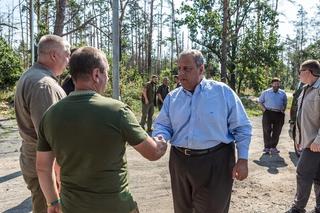
Foreign policy
China
Regarding US engagement with China, Christie has argued for a “prosperous, fair, competitive relationship, rather than a relationship that involves warfare,” and suggested tariffs could be lifted in exchange for a more equal trade relationship. In June 2023, Christie criticised Biden’s responses to the 2023 Chinese spy balloon incident and perceived lack of action on intellectual property theft, saying US Secretary of State Antony Blinken should have been more direct with China before departing on his 2023 visit to the country. Christie has raised issue with the fact that American social media companies are not allowed to operate in China, and stated that on “day one” of his presidency he would ban the TikTok app, which he believes is “poisoning American minds.” During the second debate of the race for the 2016 Republican nomination, Christie said he would “fly Air Force One over” artificial islands constructed by China in the South China Sea. He has said that “those who control the South China Sea making sure it’s free” will be the “ones who control and prevent any conflict,” arguing that the United States should “send a clear message to China” by sending more ships to the South China Sea as a result.
“China’s rise represents the most serious threat to liberty, not only around the world, but here in America, since the fall of the Soviet Union in 1991.” — 15 November 2023
Trade
Christie has indicated support for free trade policies but spoke out against the Trans-Pacific Partnership in 2015 saying he “would not trust” a deal negotiated by the Obama administration and advised Republican congressional leadership to reject the deal. He also pushed for the renegotiation of the North American Free Trade Agreement in 2015 ahead of his 2016 presidential campaign though did not offer details on what he felt needed to be changed.
“Wait for a new president to come in to negotiate a deal that would actually be in the interest of the American people and the interests of American workers.” — 6 November 2015
“Wait for a new president to come in to negotiate a deal that would actually be in the interest of the American people and the interests of American workers.” — Chris Christie, 6 November 2015
Ukraine
Christie has called the war in Ukraine a “proxy war with China,” but suggested both Ukraine and Russia should reach a negotiated compromise once US support strengthens Ukraine’s position. He has said “there is not a circumstance under which I would send American soldiers or NATO soldiers to Ukraine,” but that Ukraine should be given “every resource […] from a hardware perspective.” Christie has argued that displaying strength against Putin is essential to demonstrate that China will suffer the “same fate” if it threatens Taiwan. During the first Republican debate, he warned that “we will be next” if the United States did not respond to Russian aggression in Ukraine. In August 2023, he made a surprise trip to Ukraine where Christie met with Ukrainian President Volodymyr Zelenskyy and visited towns affected by the war, praising US support for Ukraine. Notably, he has also used the conflict to target his nomination rivals, deriding DeSantis for his equivocal support for Ukraine and suggesting Trump helped “set the groundwork” for the invasion as president. Christie believes that Ukraine’s admission to NATO is a “foregone conclusion” and that its membership should serve as a penalty and “price that Putin pays” for Russian aggression.
“Both Ukraine and Russia are going to understand that it’s time to end the killing and that there may have to be some kind of compromise.” — 12 June 2023
Taiwan
Christie has repeatedly linked the war in Ukraine with a potential future Taiwanese conflict, suggesting support for Ukraine may help prevent a costly war with China. He argued that obsequious US policy in Ukraine would encourage China to invade Taiwan, listing “humanity, freedom, liberty” as reasons to prevent such an outcome. He has also specifically warned against Chinese control of semiconductor production in the event of a Chinese invasion of Taiwan given the importance of Taiwan’s semiconductor industry to the global economy. Christie has said he does not want to send troops to Taiwan, but would if necessary, and that the United States needs to “arm the Taiwanese now” to prevent a similar conflict to Ukraine occurring.
“We can spend this money now and have Ukrainian soldiers fight our war, or we can spend a lot more money and American blood later to fight in Taiwan.” — 13 July 2023
Israel
After Christie’s visit to Israel in November 2023, during which he visited areas attacked by Hamas, he stated that “we need to stand absolutely shoulder to shoulder with Israel.” Christie has said that bringing home hostages held by Hamas is "imperative" and that the Biden administration needs to broker a deal to "stop the suffering of those innocent people who were taken hostage." He has also warned against a “false moral equivalence between Hamas and Hezbollah and the Jewish people.” Christie has dismissed calls for a ceasefire, saying that he “[doesn’t] think it’s the role of the United States to instruct the state of Israel on how to provide safety and security for its people,” and that the United States may “give advice in private” but must publicly stand with Israel. In the fourth Republican debate, he stated that, if there was a plan to "get them out safely," Christie would send US troops to rescue American hostages in Gaza.
“As long as Hamas has the ability to threaten the lives of Israelis, the number one task should be degrading Hamas and ensuring the safety and security of the Israeli people.” — 14 November 2023
Asian alliances
Beyond criticism of China, Christie has said comparatively little about US alliances in the Indo-Pacific. However, Christie has broadly indicated his support for US global leadership and engagement with other countries, stating that the United States should “shore up” its alliances around the world and work on developing a “better relationship with India.”
“America has never moved forward by ignoring the rest of the world. We can’t start now.” — 5 August 2023
Read more
- Wall Street Journal: Chris Christie, on the record
- CBS News: A Look Back at Gov. Christie’s Accomplishments, Controversies
- Council on Foreign Relations: Meet Chris Christie, Republican Presidential Candidate
- Financial Times: Chris Christie takes on Donald Trump with second US presidential run
Tim Scott
Known for: Senator from South Carolina (2013–present)
Home state: South Carolina
Age in 2024: 59 (born 19 September 1965)
Who are they?
Currently the sole Black Republican in the US Senate, Scott gained national attention for his rapid rise through the GOP ranks in a series of historic appointments. He rode the Tea Party wave to victory in 2010, being elected to represent South Carolina’s first district in Congress. Just two years after winning the House seat, Scott was chosen by then-governor of South Carolina and now Republican primary competitor Nikki Haley to replace a resigning senator. The appointment made Scott the first Black Republican from the South elected to the Senate since 1875 during Reconstruction.
He has since emerged as a prominent and passionate Republican voice on racial issues. While more recently leading police reform efforts and speaking openly about his personal experiences of racism, Scott has insisted on striking an optimistic tone and pushing back against Democrat messaging on systemic racism, often citing his journey “from cotton to Congress in one lifetime” as proof that America is “not a racist country” and is “not a land of oppression.”
“The good Lord has given me a soapbox, and I’m going to use this soapbox to talk about what needs to be spoken about.” — 11 July 2016
What should Australians know?
While Scott’s campaign stands out for his optimistic rhetoric, his foreign policy approach broadly mirrors that of his fellow candidates. However, Scott’s support for free trade negotiations in the Indo-Pacific in particular marks him out from Republicans who have taken a more protectionist approach to foreign trade. Both this and his support for a stronger US military presence in the Indo-Pacific would likely involve Australia as a key player in a Scott-led White House. Scott emphasised the importance of the Australia-US alliance after meeting with former Australian Prime Minister and current Australian Ambassador to the United States Kevin Rudd in September 2023. His relationship with Trump has also been notably cordial in recent months, suggesting Scott could play a significant role in a hypothetical future Trump administration and potentially making his foreign policy views influential
“Strengthening [the Australia-US] alliance is critical as we face shared challenges and strive to foster an open and secure Indo-Pacific, free from CCP aggression.” — 8 September 2023.
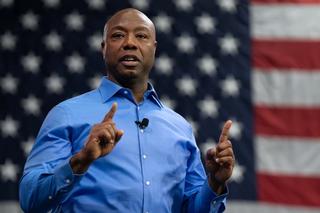
Foreign policy
China
Scott has marked China as “the most dangerous and existential threat to American prosperity and security.” Criticising Beijing’s trade practices that he believes stifle US innovation — "the crown jewel of America’s success” — Scott has called for the United States to “finish” the “new economic Cold War” by unleashing private sector innovation and bolstering US domestic competitiveness to outcompete China. He attacked Biden’s “weak leadership” in handling the Chinese spy balloon saga and has argued there are “more opportunities” for the United States to push back against China. This includes decoupling the US economy from China’s to the “fullest extent” possible and building a stronger US military presence in the Indo-Pacific. He has also specifically argued for greater US attention to countering Chinese influence abroad, highlighting the impacts of staff shortages at US embassies and China’s Belt and Road debt traps. While Scott introduced legislation that would “stick [a] ‘Made In China’ Label on TikTok” by notifying a user when an app is Chinese-owned, unlike his Republican rivals he has hesitated in calling for an outright ban of the app in the United States. In August 2023,Scott led a group of Republican senators in authoring a letter urging the US Department of Education Secretary to investigate alleged Chinese influence in the US school system. He also jointly introduced legislation in September 2023 to increase oversight of US science and technology agreements with China and criticised the potential for US-China civilian scientific collaboration to have military applications.
“We should be the city on the hill — where everybody wants to be like America. China doesn’t just want to be like America, they want to beat America.” — 23 March 2023
Taiwan
Scott is hesitant to comment on how he would respond as president to a Chinese attack on Taiwan, previously refusing to answer the hypothetical question. He has directly criticised rival candidate Ramaswamy for suggesting US support for Taiwan could be withdrawn, saying he is “dead wrong” to “put an expiration date on our allies.” However, he has emphasised the need for the United States to “stand shoulder to shoulder with the Taiwanese government” and continue to provide resources to the Taiwanese military, arguing that delivery on US commitments to Taiwan requires an “industrial revolution” in US military resources and equipment production. In July 2023, he praised the Senate’s approval of a bill to strengthen the US trade relationship with Taiwan, affirming Taiwan’s role as a “reliable partner” in promoting freedom and democracy across the Indo-Pacific.
“We must stand shoulder to shoulder with the Taiwanese government and the military when it comes to defending what we believe is our ally.” — 8 June 2023
Trade
Scott has called for stronger US leadership on trade and a return to free market principles, including a renewed commitment to “free enterprise,” “free trade” and the “rule of law.” He previously voted in favour of granting trade promotion authority to fast-track the Obama administration’s negotiations for the Trans-Pacific Partnership in 2015. While not explicitly endorsing or opposing a US return to the TPP, Scott has since cautioned against allowing other countries to have “the prime position to dictate Japan and the Asian market” and emphasised the importance of the United States“ leading the conversation on new trade agreements” that bolster US access to global markets.
In late 2021, Scott signed a letter calling for the Biden administration to initiate digital trade negotiations with US allies and partners in the Indo-Pacific, who were joining Beijing-led trade blocs in the absence of US leadership. While he has described himself as a “free trader” and previously criticised Trump-era tariffs on China, he has since described them as “prudent.”
“We must boost economic growth and competitiveness through a renewed commitment to free enterprise, free trade, rule of law and international US leadership.” — 31 May 2023
Ukraine
Scott has suggested that Biden’s “weakness on the world stage” emboldened Russia to invade Ukraine and has supported the provision of military aid to Ukraine under the belief that it is in the US “vital national interest.” In Scott’s view, “degrading the Russian military” serves two key purposes: preventing “attacks on the homeland” while reducing Russia’s capabilities to launch an attack on NATO territory that would draw in the United States. While refusing to comment on Biden’s decision to send cluster munitions to Ukraine, Scott used the opportunity to reiterate that the president has “led from behind” in delivering military equipment for Ukraine and emphasise that his administration would have a more capable defence industrial base to provide weapons for allies. Under his hypothetical presidency, Scott says, “we wouldn’t be in this position at all.”
“We must ensure Ukraine has the military equipment needed to defend themselves.” — 26 February 2022
Climate change
While Scott acknowledges that climate change is occurring, he has a reliable record of voting against policies aimed at curbing carbon emissions. He joined calls for Trump to withdraw from the Paris Climate Agreement in 2017 and most recently voted against the Inflation Reduction Act, a Biden administration bill seeking to funnel billions into clean energy technologies, arguing that spending under the bill would instead accelerate inflation.
“There is no doubt that man is having an impact on our environment. There is no doubt about that. I am not living under a rock.” — 10 June 2017
“We should be the city on the hill — where everybody wants to be like America. China doesn’t just want to be like America, they want to beat America.” — Tim Scott, 23 March 2023
Asian alliances
Scott sits on the US Senate Committee on Foreign Relations and was part of a crucial bipartisan Committee vote in July 2023 to effectively fast-track the transfer of US military hardware to Australia. Vital to implementing the AUKUS pact, the amendment authorised the transfer of two Virginia-class nuclear-powered submarines from the US fleet to Australia as well as the export of defence services to “help Australian private-sector personnel develop their own Australian submarine industrial base.” It also granted Australia and the United Kingdom “priority status” in the technology transfer process and established an AUKUS Senior Advisor to the State Department, elevating the department’s engagement with AUKUS.
Scott criticised the current US military footprint in the Indo-Pacific as insufficient and has called for the United States to build a “stronger presence” in the region, though he has not provided details on precisely what this would entail. He has also emphasised the importance of demonstrating that the United States is loyal to its allies and partners, specifically singling out Japan and Taiwan. Scott once described Japan as “a key ally for the US” and highlighted deepened US-Japan cooperation as critical to the pursuit of a “free, open, and secure Asia-Pacific.”
“We need to make sure that our allies — Japan, specifically, and Taiwan — know that we are loyal to our allies.” — 8 June 2023
Read more
- Australian Financial Review: ‘Positive’ Scott takes on Trump in presidential race
- Roll Call: Five things to know about Tim Scott’s record in Congress
- The Guardian: ‘The Exact Opposite of Donald Trump’: Republican senator Tim Scott’s vision for America
- Council on Foreign Relations: Meet Tim Scott, Republican Presidential Candidate
Doug Burgum
Known for: Governor of North Dakota (2016–present)
Home state: North Dakota
Age in 2024: 68 (born 1 August 1956)
Who are they?
The current governor of North Dakota made the jump from business to politics relatively recently. After selling his Great Plains Software company to Microsoft for US$1.1b in 2001, Burgum announced his run for North Dakota governor in 2016. Despite having no political experience, Burgum went on to win after a come-from-behind victory in the Republican primaries in which he defeated the candidate that the North Dakotan Republican party had endorsed. While he has acknowledged Joe Biden’s 2020 election win, Burgum has steered clear of criticising Trump directly, instead calling for the country to “move on” and focus on “economy, energy, and national security.” Burgum has also made headlines for his positions on climate change and offers of US$20 gift cards to donors to his campaign. To win the Republican nomination, Burgum would require an even larger upset than that which secured his North Dakota governorship seven years ago, but he secured a place on the Republican debate stage earlier than rival high-profile candidates including Mike Pence and Chris Christie.
“Most of America doesn’t know who Doug Burgum is. It’s the job of a campaign to try to explain to people […] Every question we get is about the past and not the future. I’m running for the future of America.” — 6 August 2023
What should Australians know?
Similarly to Trump, Burgum has emphasised his credentials as a businessman and political outsider to gain traction. He has offered relatively few specifics on his foreign policy approach, but has emphasised economic competition, trade and energy independence as foreign policy instruments to promote US primacy and prevent conflicts overseas. Despite taking a harder line on China during the campaign, Burgum has not supported the decoupling policies promoted by other candidates, instead pushing for China to become economically dependent on US trade. He takes a narrow view of the role of the federal government, a position which he has used to sidestep the ‘culture war’ issues on which other candidates are more focused.
“There’s an entire industry built around commenting on President Trump, and I’ll just leave it to the pundits […] We should be talking about the energy, economy and national security.” — 6 August 2023
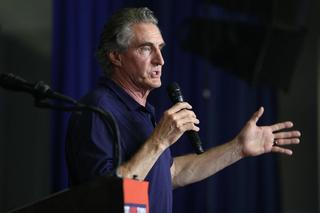
Foreign policy
China
Burgum has characterised his approach to competition with China as diplomacy “supercharged” by dominance in various sectors. He has labelled China a “common enemy” of the United States, and described the two countries as being in a “cold war” and has outlined a three-step approach to China competition: “energy dominance”, “unleash the American economy” and “defeat our adversaries.” He has called for NATO to recognise China as a threat to “all Western democracies” and said that to compete with China militarily, his administration would increase defence spending with the “Reagan standard” of at least 5 per cent of GDP as the “new floor.” Burgum has criticised Biden’s approach to China, describing it as a “disastrous policy of appeasement.”
“We buy from China, but we don’t sell to China. It would be great if they were dependent on us, as opposed to us dependent on them.” — 10 July 2023
Taiwan
Burgum has echoed the deterrence policies of a number of other candidates, which he says requires “an intense focus on economic statecraft as well as military deterrence in a manner we don’t see today from this administration.” During the first Republican debate, he stated that the United States needs to provide Taiwan with anti-ship missiles to achieve “peace through strength.” He has previously said the United States should do “two things at once,” by supporting Ukraine while simultaneously reinforcing Taiwan’s defence and deterring Chinese aggression. In 2018, he heralded the “sister-state relationship” between Taiwan and North Dakota, affirming the strong economic links and shared values, like democracy and human rights, underpinning bilateral ties.
“Our objective should be to deter China from attacking Taiwan in the first place by preparing to defend Taiwan and win if necessary.” — 7 June 2023
Climate change
In 2021, at the start of his second term as governor, Burgum announced his goal for North Dakota to become carbon neutral by 2030. However, he is notably against government mandates and regulations targeting the fossil fuel industry, likely due to North Dakota’s role as one of the country’s major oil and gas producers. Burgum has argued that policies targeting the fossil fuel industry are “binary” and “outdated,” because they hamper the US competition with China, by strengthening the US' "adversaries" and creating “economic poverty.” Emphasising “innovation, not regulation,” Burgum pledged to reduce the state’s carbon footprint through carbon capture and storage. Viewing energy policy as intertwined with national security, Burgum has called for the United States to bolster its domestic energy supply so that it can sell energy to allies and “stop buying it from our enemies.” Burgum has characterised North Dakota as a “leader in domestic energy,” and believes that his vision for reducing emissions while retaining its domestic industry provides a model that could be implemented on a national scale.
“You can’t separate China policy from what they’re calling climate policy — but I’ll call it energy policy — because it makes no economic sense.” — 10 July 2023
Trade
Burgum has said the United States needs a trade policy that encourages countries to “unhook from China’s supply chain and hook onto an American supply chain instead.” He has previously emphasised the importance of investment for North Dakotans as governor and expressed concern at the economic impact of the imposition of trade tariffs by China in 2018. He praised the signing of the Trump administration’s Phase One Trade Agreement for greater trade with China in 2020, was a strong supporter of the United States-Mexico-Canada Agreement, and praised Australia and Japan for their efforts to keep the Trans-Pacific Partnership alive after the US withdrawal under Trump in 2017.
“China is [North Dakota’s] fourth-largest export market and a major buyer of our agricultural products, including our No. 1 export market for soybeans. Disrupting that trade relationship puts our farmers at a disadvantage.” — 4 April 2018
“You can’t separate China policy from what they’re calling climate policy — but I’ll call it energy policy — because it makes no economic sense.” — Doug Burgum, 10 July 2023
Ukraine
Burgum has emphasised the need for the United States and its allies to “stand together” in support of Ukraine, highlighting the “significant” obligations the United States has to its allies in western Europe. However, he has also urged stronger accountability and transparency in US spending, arguing that US support for Ukraine cannot take the form of a “blank check.” Burgum has used the crisis as an opportunity to reiterate the importance of US energy security, noting North Dakota’s efforts to divest from its investments with Russian exposure and calling for the Biden administration to bolster domestic energy production to reduce global reliance on Russian oil and gas exports. Like Nikki Haley and Chris Christie, he has drawn links between the war in Ukraine and US competition with China, stating that a Russian victory would also constitute “a win for China.” He has also suggested that US sanctions on Russian oil currently enable China to access energy at a cheaper price, and has called for a more coherent US “global strategy.”
“When we empower American innovation and energy production, we strengthen the value of the dollar, stop China and Iran, and prevent wars such as Russia’s invasion of Ukraine.” — 6 June 2024
Israel
Burgum has blamed “the policies of the Biden administration” for the outbreak of global conflicts, including in Israel. He has described Israel’s war with Hamas as an Iranian “war on America” and claimed that Biden is “funding both sides” of the conflict by using Qatar for backchannel negotiations. Burgum has also said the United States should “consider” sending military forces to Israel.
"A safe and prosperous Israel means a safe and prosperous America.” — 9 November 2023
Asian alliances
Burgum has said that “strong partnerships and strong allies” are needed to successfully compete with China. He has singled out India as one of the “most important partners” of the United States and said that “the closer the US-India relationship becomes, the better for [US] national security.” In October 2022, he led a North Dakota trade delegation to Japan and emphasised Japan’s strategic and economic importance. As governor, he has also supported the work of US allies on the Trans-Pacific Partnership and praised the Trump administration’s US-Japan Trade Agreement after attending its signing in 2019.
“Japan is an important trade partner for North Dakota and a key strategic ally for our nation.” — 3 October 2022
Read more
- Council on Foreign Relations: Meet Doug Burgum, Republican Presidential Candidate
- Wall Street Journal: Doug Burgum, on the record
- Wall Street Journal: Doug Burgum: Why I’m Running for President in 2024
- USA Today: President Biden has options for increasing energy supply. He just needs to use them.
Asa Hutchinson
Known for: Governor of Arkansas (2015–23)
Home state: Arkansas
Age in 2024: 74 (born 3 December 1950)
Who are they?
Despite being the final candidate to qualify for the first Republican debate, the former Governor of Arkansas (2015–23) has had a long career in-and-around Washington and Little Rock politics. Appointed by former President Ronald Reagan in 1982 as the youngest US Attorney in the country at 31 years of age, Hutchinson rose to prominence for his successful prosecution of a white supremacist militia. Later elected to Congress (1997–2001), he was appointed by the Bush administration to be Administrator of the Drug Enforcement Administration (2001–3) and Under Secretary of Homeland Security for Border and Transportation Security (2003–5). Hutchinson has emphasised his lengthy government resume in his campaign, but his traditionalist foreign policy approach and direct criticisms of former president Trump set him apart from much of his party and leave him with a long-shot path to the nomination.
“I’m not an outrageous person.” — 25 April 2023
What should Australians know?
Hutchinson has distinguished himself from the Republican party’s dominant isolationist wing with his call to re-orient the party back towards the pursuit of US global leadership, international engagement and free trade. He has cast himself as a conservative in the mould of Ronald Reagan and argued that the unexpectedly poor results for Republican candidates in the 2022 midterm elections was not a rejection of “Republican ideas” but of “extreme” candidates who “did not embrace Republican principles.” Hutchinson has called for the United States to engage and support its allies and “lead the free world because we must.” While Hutchinson has emphasised that sometimes “we make a mistake listening to the loudest person in the room,” it remains to be seen if he can have cut-through amid the noise of a crowded primary field.
“There are some who want the United States to disengage from the world and to isolate ourselves. Isolationism only leads to weakness, and weakness leads to war.” — 26 April 2023
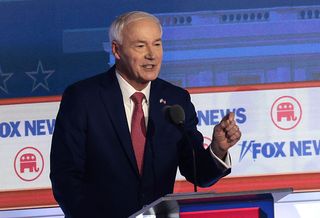
Foreign policy
China
Like his rival candidates, Hutchinson has criticised US dependency on China and said that the United States “cannot yield to China in terms of global leadership.” He believes the United States can “continue a trade partnership with China” provided it promotes US interests and values, but also called for the “responsible decoupling in key industries and technologies … [and] reshoring of manufacturing capabilities to the US.” He has echoed the concerns of other candidates over Chinese debt holdings and ownership of US land. As governor, Hutchinson emphasised the economic opportunities of Chinese trade for Arkansas’ significant agricultural sector and pushed for China to open up its markets to more US exports.
“When it comes to China, the Communist leadership must know our determination to not allow Taiwan to become another victim of China’s expansion.” — 1 December 2022
Trade
Hutchinson has advocated for minimising barriers to free trade and as governor repeatedly stressed the importance of global trade to the continued growth of the Arkansas economy. He was one of a handful of governors who undertook diplomatic missions in 2017 to make new appeals to international business and reassure traditional US partners in Europe and Asia who were unsettled by Trump’s scepticism of foreign trade. While Hutchinson expressed “great concern” at Trump's references to trade ‘protection’ in his inaugural presidential address, he was not concerned by Trump’s withdrawal from the Trans-Pacific Partnership in 2017, arguing that global trade would continue through bilateral and multilateral agreements.
“International trade creates jobs in the United States, and the emphasis on fair and free trade is an essential element of our foreign policy.” — 20 May 2021
Ukraine
Hutchinson believes Russia represents a serious threat to US national security and “ideals of freedom.” In line with his campaign for the United States to play a more active role in global affairs and maintain the rules-based international order, he has emphasised the importance of US leadership in bringing European allies together. Hutchinson has argued that continued US support for Ukraine’s defence is in the US national interest, denouncing the “isolationist” views of GOP rivals Trump and DeSantis. He has also levelled criticisms at the Biden administration, arguing that the “disastrous” US withdrawal from Afghanistan in 2021 made the United States seem “weak” and prompted Russia’s invasion, and that poor US industrial planning has prolonged the war. Hutchinson echoed the concerns of other GOP candidates saying that any “weakness” in US support for Ukraine will embolden other “aggressors” to "take more significant action,” such as escalate Chinese aggression toward Taiwan.
“By taking a supportive and public stand in Ukraine, we’re sending a message to Russia and to China that their aggressive posture towards other nation-states is unacceptable.” — 22 February 2023
Taiwan
In contrast to his rival candidates, Hutchinson has thus far said comparatively little about Taiwan in public. In his April 2023 candidacy announcement, Hutchinson said the United States must show “determination to not allow Taiwan to become another victim of China’s expansion” and he has emphasised the need for stronger relationships with US Indo-Pacific allies to deter China. Like a number of his rivals, he has also linked the conflict in Ukraine with Taiwan, saying weak US support for Ukraine is likely to provoke aggressive action in other theatres.
“I’m supporting our funding of the fight in Ukraine because if we show weakness there then you’re going to have our aggressors take more significant action like China toward Taiwan.” — 2 May 2023
Climate change
Hutchinson has pledged to embrace an “all of the above” energy policy that “empowers the private sector”, "unleashes” US energy production and ends “the war on fossil fuels.” He has vowed to remove barriers to nuclear power, cut taxes and lift private sector regulations on pipeline construction and drilling. Hutchinson has criticised Biden administration climate mandates that he believes harm US workers and the economy, and he was one of several Republican governors in 2020 who pledged to sue the federal government if the newly elected Biden administration sought to implement policies and regulations aimed at cutting carbon emissions in the power sector. Hutchinson has also stated that he would withdraw from the Paris Climate Agreement due to the belief it hampers US economic growth.
“We need a pro-growth energy policy that is not focused on limits but on production.” — 26 April 2023
Israel
Hutchinson made four visits to Israel as Governor of Arkansas and a member of Congress. During a 2021 visit, he described support for Israel as “a fundamental part of American culture.”
Hutchinson has maintained strong support for Israel in the current conflict, stating that “the United States is right to act in support of Israel.” Hutchinson has said that as president he would ask Congress to authorise the use of military force against Hamas, noting the taking of American hostages. He has also said that the United States should not pressure Israel for a ceasefire “until there is a commitment to release all the hostages.” In Hutchinson's view, "the goal to eliminate Hamas should continue to guide Israel's strategy."
“We don’t want a broader war, but we want to make sure that Hamas understands that you cannot attack an ally like Israel without those consequences that threaten America as well.” — 19 October 2023
Asian alliances
As part of his China policy and support for a stronger military, Hutchinson says he would “bolster relationships with Indo-Pacific allies through trade agreements and strategically appropriate mutual defense pacts” and “strengthen and reaffirm US commitments to existing alliances,” though he is yet to offer further specifics. His emphasis on trade agreements for security mirrors his wider China policy and belief that participation in global trade is a source of US strength and global primacy.
“As president, I will bring out the best of America. We will stand with our allies, and we will stand with our friends.” — 26 April 2023
Read more
- Council on Foreign Relations: Asa Hutchinson: A Distinguished Career in Domestic Counterterrorism
- The Washington Post: Asa Hutchinson, throwback to pre-Trump GOP, kicks off 2024 presidential run
- National Public Radio: In Post-Trump GOP Split, Gov. Asa Hutchinson Often At Odds With His Party
- Politico: Inside the text-for-pay campaign that got Asa Hutchinson on the debate stage





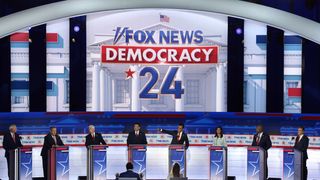


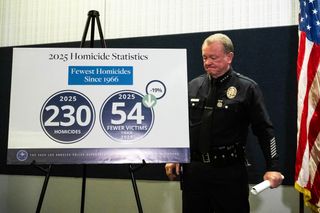
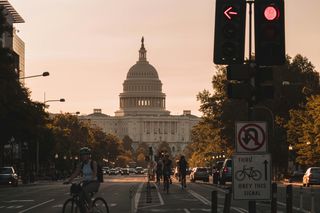
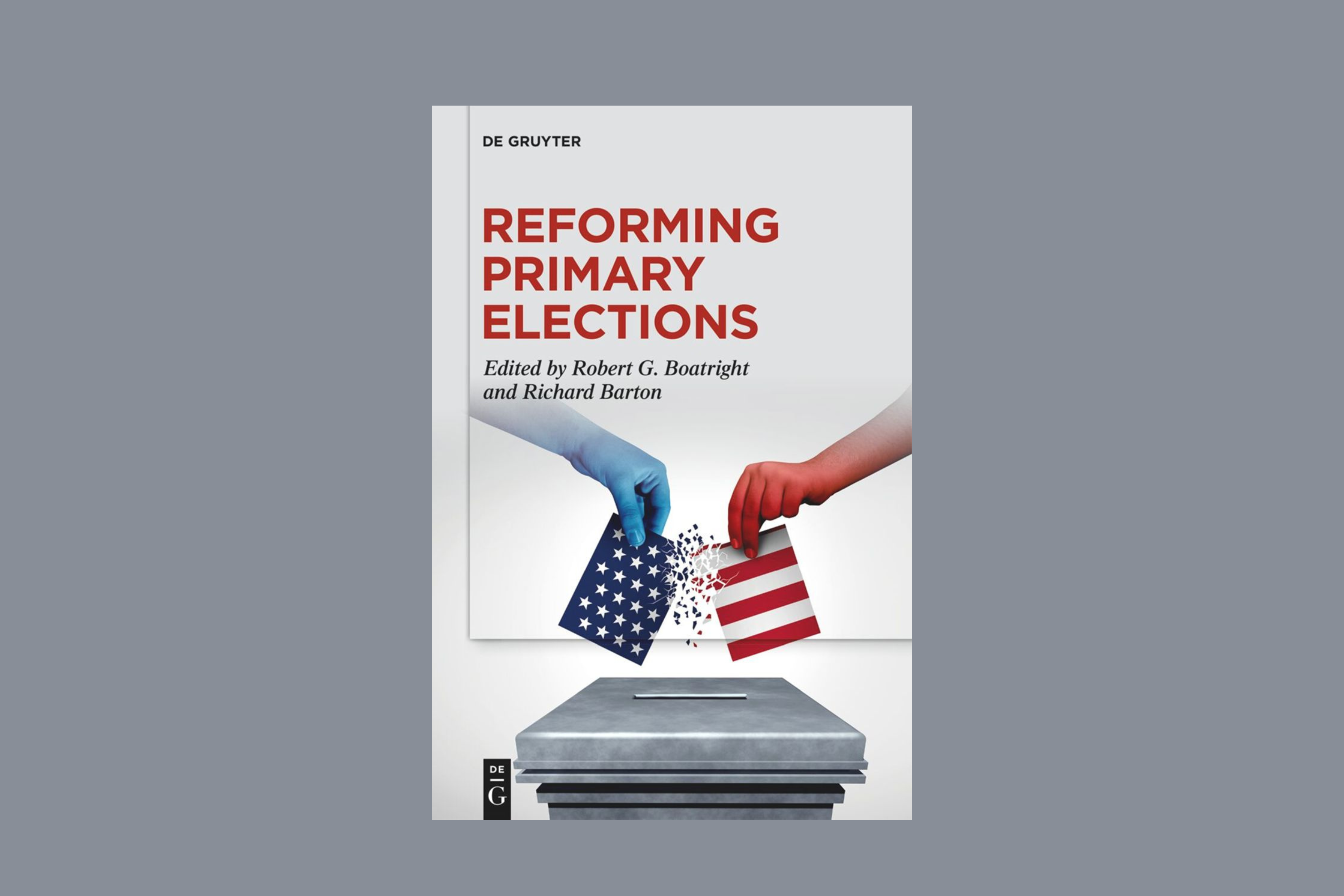.png?rect=0,3,6000,3994&w=320&h=213&auto=format)